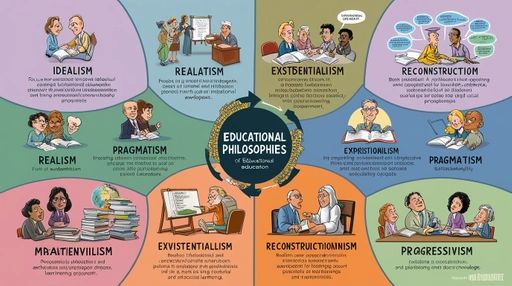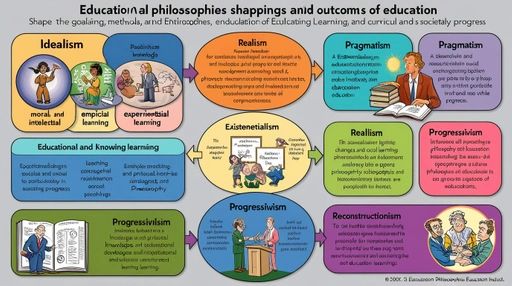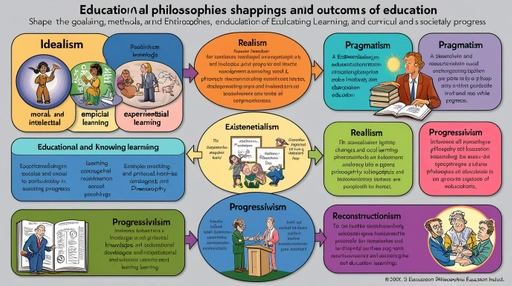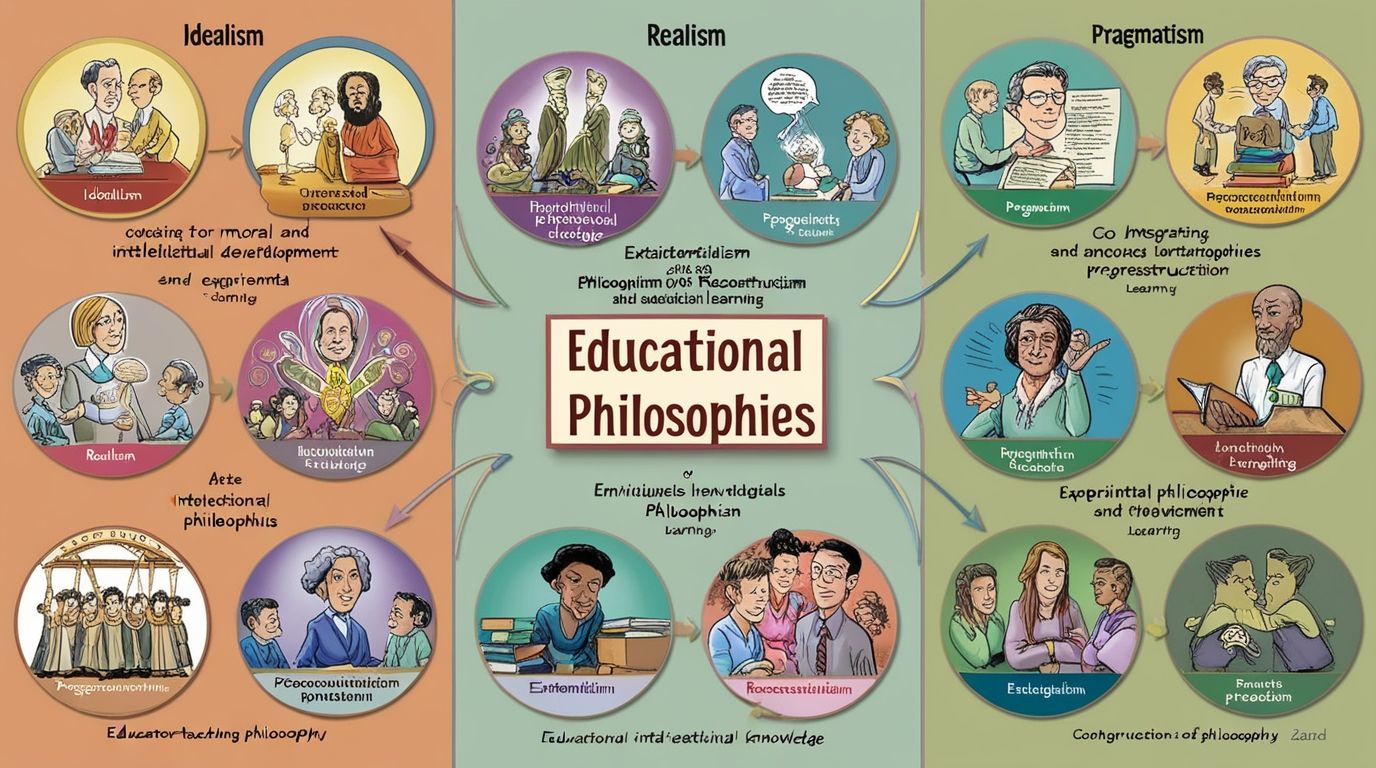Educational Philosophies and Their Impact, Education has always been a cornerstone of human development, serving as the means to transfer knowledge, skills, values, and beliefs across generations. Over time, various educational philosophies have emerged, each offering a unique perspective on the purpose, methods, and outcomes of education. These philosophies not only shape teaching practices but also influence the broader objectives of educational systems. This article explores key educational philosophies and their impact on learning, teaching, and society at large.
Major Educational Philosophies
1. Idealism
Idealism emphasizes the pursuit of absolute truths and the development of the mind. Rooted in the works of philosophers like Plato, this philosophy prioritizes intellectual and moral development over practical skills. Idealism holds that reality is constructed through ideas and that education should focus on uncovering universal truths through critical thinking and introspection.
Impact:
- Encourages critical thinking and intellectual rigor.
- Promotes values-based education, emphasizing ethics and morality.
- May neglect practical or vocational skills, creating gaps in real-world applicability.
2. Realism
Realism, championed by Aristotle, posits that education should focus on the tangible world and empirical evidence. It emphasizes observation, experimentation, and the application of reason to understand reality. Realism aligns closely with the scientific method and seeks to equip learners with factual knowledge and critical skills.
Impact:
- Develops logical reasoning and analytical skills.
- Lays the foundation for scientific inquiry and evidence-based learning.
- Sometimes overlooks creativity and emotional intelligence.

3. Pragmatism
Pragmatism, associated with John Dewey, emphasizes learning through experience and problem-solving. This philosophy advocates for hands-on, inquiry-based education and views learning as a dynamic process tailored to individual needs and societal demands.
Impact:
- Promotes experiential learning, making education more engaging and relevant.
- Fosters critical thinking, collaboration, and adaptability.
- May lack focus on foundational theoretical knowledge.
4. Existentialism
Existentialism focuses on individual freedom, choice, and self-determination. Inspired by philosophers like Søren Kierkegaard and Jean-Paul Sartre, this philosophy emphasizes personal meaning and the subjective nature of learning. Education under existentialism seeks to empower learners to define their purpose and values.
Impact:
- Encourages self-reflection and personal growth.
- Recognizes the unique potential of each learner.
- May lead to a lack of structure or guidance in educational settings.
5. Perennialism
Perennialism advocates for timeless truths and a curriculum centered on enduring works of literature, philosophy, and history. This philosophy views education as a means to cultivate rational thought and moral virtue.
Impact:
- Preserves cultural heritage and intellectual traditions.
- Strengthens critical thinking through exposure to classic texts.
- Can be seen as rigid and resistant to modern innovations.

6. Progressivism
Progressivism, also influenced by John Dewey, focuses on preparing students for a rapidly changing world. It prioritizes student-centered learning, collaboration, and social responsibility. This philosophy advocates for education that evolves with societal needs.
Impact:
- Promotes active, participatory learning.
- Integrates real-world issues into the curriculum, fostering social awareness.
- Sometimes criticized for lacking rigorous academic standards.
7. Essentialism
Essentialism emphasizes a structured curriculum and mastery of core subjects like math, science, and language arts. It focuses on preparing students to succeed in society by equipping them with essential knowledge and skills.
Impact:
- Provides a strong foundation in fundamental disciplines.
- Prepares students for standardized assessments and academic benchmarks.
- Can overlook creativity and individual interests.
8. Reconstructionism
Reconstructionism views education as a tool for social change and envisions schools as agents of reform. This philosophy encourages critical examination of societal structures and fosters the development of solutions to global challenges.
Impact:
- Empowers students to address social injustices.
- Encourages interdisciplinary learning and critical analysis.
- May prioritize activism over academic content.

The Impact of Educational Philosophies on Teaching
Curriculum Design
Educational philosophies play a significant role in shaping curricula. For instance:
- Idealism leads to a focus on theoretical subjects and moral education.
- Realism emphasizes science, mathematics, and empirical studies.
- Progressivism promotes interdisciplinary and project-based learning.
- Essentialism ensures a focus on foundational subjects and standardized curricula.
Teaching Methods
Philosophies influence teaching strategies by defining the teacher’s role:
- In Idealism, teachers act as intellectual guides, leading discussions and promoting critical thinking.
- Pragmatism and Progressivism encourage teachers to facilitate hands-on activities and collaborative learning.
- Existentialism gives teachers the freedom to adapt methods to individual student needs.
- Perennialism often relies on lecture-based approaches to analyze classical texts.
Assessment Practices
Assessment approaches also vary based on educational philosophies:
- Essentialism and Realism favor standardized tests to measure mastery of core subjects.
- Progressivism and Pragmatism lean toward formative assessments, portfolios, and peer evaluations.
- Existentialism supports self-assessment and reflective practices.
The Societal Impact of Educational Philosophies
Cultural Preservation and Innovation
Educational philosophies like Perennialism and Idealism emphasize preserving cultural heritage and universal truths, ensuring that timeless values are passed on. Conversely, Progressivism and Reconstructionism drive innovation by addressing contemporary societal issues and preparing learners for future challenges.
Equity and Inclusion
Philosophies such as Existentialism and Progressivism advocate for personalized learning and inclusivity, ensuring that diverse learner needs are met. They promote equity by recognizing the unique potential of every individual, fostering a more inclusive educational environment.
Economic and Technological Development
Pragmatic and essentialist approaches have contributed significantly to technological advancements and workforce readiness. By focusing on skill development and empirical knowledge, these philosophies align education with economic and technological demands.
Empowerment and Social Change
Reconstructionism and progressivism view education as a means to empower individuals and transform society. By encouraging critical thinking and social responsibility, these philosophies inspire students to address global challenges and advocate for justice and equality.
Balancing Philosophical Perspectives
In practice, no single educational philosophy can address all aspects of teaching and learning. Effective education often requires a balanced approach that integrates elements from multiple philosophies. For example:
- Combining Essentialism with Progressivism can ensure both academic rigor and adaptability.
- Integrating Pragmatism and Existentialism can balance experiential learning with personal growth.
- Blending Idealism and Reconstructionism can foster ethical awareness and social responsibility.
Conclusion
Educational philosophies serve as the foundation for diverse teaching practices, curricula, and educational goals. Each philosophy offers unique insights into the nature of learning, shaping not only individual student experiences but also societal outcomes. By understanding and integrating these philosophies, educators can create dynamic, inclusive, and impactful learning environments that prepare students to thrive in an ever-evolving world.

10 thoughts on “Educational Philosophies and Their Impact”
Comments are closed.